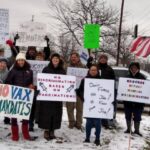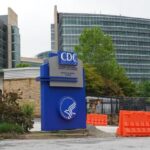By Zachary Stieber
The protection provided by a second COVID-19 vaccine booster was worse than that bestowed by an initial booster, with the shielding trending negative after a period of time, according to a new study.
Protection against symptomatic infection was boosted to 64 percent 7 to 30 days after an initial Pfizer or Moderna booster when compared with the protection the person had from a primary series, researchers in France estimated. The measure is known as relative effectiveness.
The relative booster effectiveness against symptomatic infection, however, quickly dropped—reaching 33 percent 90 to 120 days after injection and 8.8 percent 150 to 180 days after infection, the French researchers found.
A second booster increased the shielding to 39 percent but the difference from the first booster turned negative after 120 days, hitting negative 32.6 percent by 210 days.
“Although additional protection with the second booster dose was achieved, it decreased over time reaching levels below 10% at >90 days post vaccine administration,” Cynthia Tamandjou and the other researchers, all with France’s national public health agency, said in their study, which was published as a preprint by medRxiv.
The lower protection from a second dose may stem from immune imprinting, or repeatedly stimulating people’s immune systems with vaccines aimed at the Wuhan virus variant.
While that approach helped protect against that variant, it has not been in circulation since 2020, and “frequent exposure to the same antigen is to the detriment of new neutralizing responses against variant antigens,” the researchers said. They called for human clinical studies to examine the impact of immune imprinting.
The researchers arrived at the results after analyzing COVID-19 tests that were logged via government surveillance systems and conducted on people who reported COVID-19-like symptoms, including people who tested positive and people who tested negative for the disease. Only people who were aged 60 and older, and who were tested between March 21, 2022, and Oct. 20, 2022, were included. People were considered vaccinated if they received a booster at least seven days before the test. Researchers ended up with 456,657 cases, and 476,834 controls.
Limitations included possible unmeasured confounding or factors that may influence the results, such as being vaccinated potentially influencing the decision to get tested.
The paper was completed “as part of routine work at Public Health France,” the authors said in the section for funding disclosures. They did not report any other funding.
Previous research has shown that the two-dose primary series of the Moderna and Pfizer vaccines work considerably worse against Omicron and its subvariants, with protection against infection nearing zero or even turning negative after a period of time. The protection against severe illness is estimated to be better, but also comes in lower than against earlier strains.
Booster dose protection also wanes rapidly, researchers have found. One recent study indicated that a second booster provides negligible protection above a first.
Other Recent Papers
Another recent paper on vaccine effectiveness, from the Netherlands, concluded that effectiveness of a primary series against infection during the Delta era was 47 percent but dropped after Omicron emerged in late 2021 to -36 percent. Protection from a booster was estimated at -30 percent.
The researchers, with the National Institute for Public Health and the Environment, drew from surveys given to people who tested positive for COVID-19 who are participating in a five-year study on vaccine effectiveness.
“During the Omicron period no direct protection against infection was found,” the researchers said.
They said they were unable to estimate the protection from a second booster because most people who weren’t vaccinated were under 60 and most people who received another booster were over 60, “resulting in a faulty comparison.”
The group also estimated what they called effectiveness against infectiousness, or transmission, and found that it was worse during the Omicron era. The effectiveness was estimated at 45 percent for index cases with a primary series and 64 percent for index cases with a first booster. Index cases were defined as a person participating in the study who tested positive first in their household. People with prior infection were excluded.
When taking into account the time since vaccination, the effectiveness of vaccines against infectiousness was strongest in the first three months and dropped to 32 percent for the primary series and 58 percent for a booster after three months.
The study period was from July 23, 2021, to Aug. 7, 2022.
The paper was published on the preprint server medRxiv. Limitations included some of the infections potentially coming from a source other than the index case.
A third paper, also from Dutch researchers and released ahead of peer review, estimated that people with a combination of vaccination and natural immunity had better protection against infection, but that additional vaccine doses did not increase shielding.
“This indicates that among populations with high levels of immunity, additional vaccine doses have the potential to reduce risk of any infection only temporarily,” the researchers, who drew from the same five-year study, said.
Vaccination Study on the Coronavirus, or VASCO, is funded by the national government.
Pfizer and Moderna did not respond to requests for comment on the papers.






